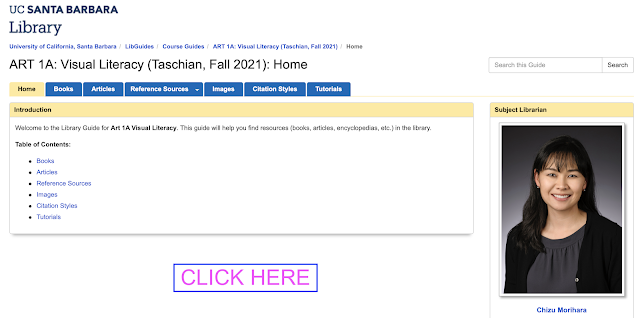UCSB Library Art 1A Research Page:
Chizu Morihara (Art & Architecture Librarian):
cmorihara@ucsb.edu
(805) 893-2766
Paper Format (PAPER TOPIC HERE):
- 8 pages of text (this does NOT include the cover page, bibliography or images)
- Double-spaced
- Cover page
- Footnotes or endnotes
- Bibliography
- Images (in a separate document at the end of the paper)
- Use at least 8 different research sources (including peer reviewed
journal articles, books, exhibition catalogs, monographs, etc.)
- Use at least 10 citations
- Upload an electronic copy of your paper (HERE) to the plagiarism scan in a WORD document (without pictures) and give your Teaching Assistant a hardcopy with pictures.
1) Do I have the proper number of citations and sources?
2) Did I properly format my citations using MLA or Chicago?
3) Do I have a properly formatted formal bibliography?
4) Did I adhere to the proper paper length?
5) Do I have a clear, and specific thesis statement?
6) Does my thesis statement specifically relate to the final draft of my paper?
7) Did I run spell check (repeatedly)?
8) Did I carefully edit to make sure that I used proper grammar, and were my tenses consistent?
9) Did I formulate clear arguments and substantiate all of my claims with clear and concrete examples?
10) Did I avoid sweeping generalizations and vague assertions?
11) Did I use casual colloquial language in my formal research paper? If so, find more precise ways to describe the point being made.
12) Did I use scholarly research sources such as peer-reviewed journal articles, scholarly articles and books rather than sources such as blogs, Wikipedia, encyclopedias etc (that are not acceptable sources for a formal research paper).
13) Did I properly cite quotes and summaries of other people's intellectual property (footnotes and in-text citations)?
14) Did I avoid excessive biographical information about the artist? Instead I should only include biographical information that is directly relevant to their artistic practice.
15) Would anyone reading my paper understand what I am trying to convey, or do I need to more clearly define the scope of my research and ultimately the point of my paper?
16) Did I place the pictures at the end of my paper? If I embedded them in the text, I need to remove them and place them at the end of my paper.
17) Did I remember to remove the pictures from the electronic draft of my paper that I uploaded to the plagiarism scan?
18) Did I remember to upload my paper to the plagiarism scan (HERE), and give a hard copy to my Teaching Assistant (with the pictures)?
19) Did I remember to put my name, perm number and section time on my paper?
20) Did I remember to frequently save, backup and email drafts of my paper to myself (just in case my computer crashes)?
21) When I had questions, or needed help, did I reach out to my TA, professor or CLAS?
GENERAL TIPS ON WRITING YOUR PAPER:
1) The selection of a good thesis and supporting examples is an important part of producing a good paper. Be selective. The paper is about how to look closely at works of art and how your evaluation of objects and images is expanded by the specific context in which they are presented.
2) Write primarily with nouns and verbs. Avoid unnecessary (especially vague and imprecise) adjectives and adverbs.
3) Revise and rewrite. Proofread your work. Do not rely solely on "spell check."
4) Use the dictionary to refer to words you do not fully understand.
5) Do not overstate, or excessively use qualifiers (such as very, rather, little, etc.).
6) Use orthodox diction and accurate spelling. ("Its" is possessive; "It's" is a contraction for "it is," "Its' " doesn't exist. "Their" is possessive, "They're" is a contraction of "they are," There is declarative).
7) Be clear. Make references clearly. (Do not use the word "this" as the subject of a sentence).
8) Do not let your opinions get in the way of your writing.
9) Avoid using Wikipedia, blogs, newspaper articles and other materials that are not scholarly. These ARE NOT research materials for a formal research paper.
10) Get to the point quickly. Concentrate on quality of writing not quantity of words.
11) For help with formatting MLA and Chicago citations, visit Purdue Owl: https://owl.purdue.edu/owl/purdue_owl.html
For help writing the paper contact CLAS at 893-3269. They have a writing lab that will help you with papers, and will even proofread your papers. They also offer help specifically to students for whom English is a second language. CLAS site: http://www.clas.sa.ucsb.edu/


